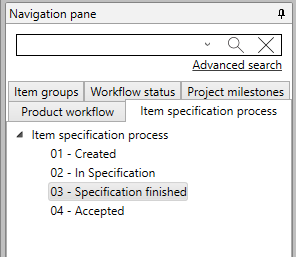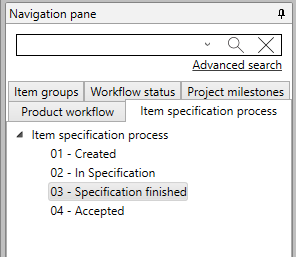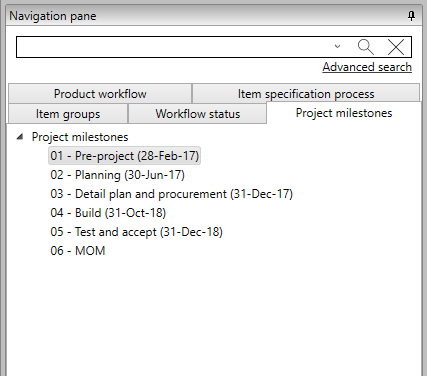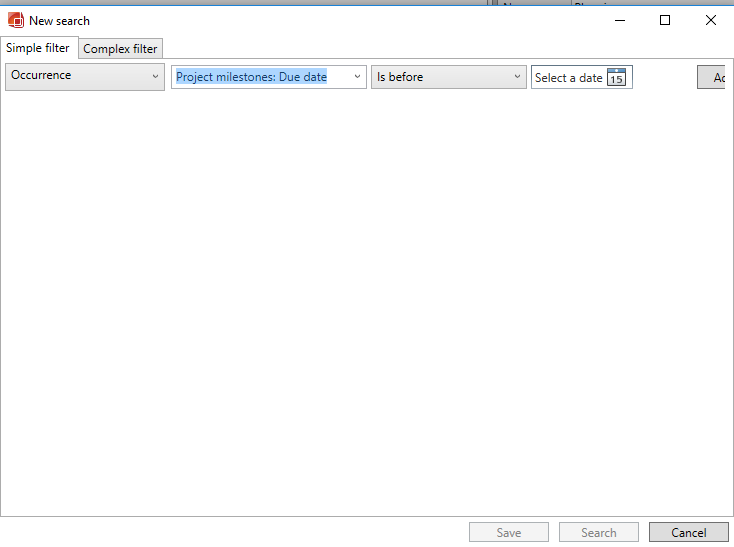You can add statuses to itemsItems, occurrences, products or systems to keep an overview of where in a work process each is placed.
For example, if you need to have a specification process for items with an overview of:
- which items are still being specified
- which are finished but not yet acknowledged and
- which have been accepted by the building end users as complete
You can use statuses for this. You can then also use the same - or new - status sets for occurrences, , systems, or rooms can be assigned pre-defined Status values to track their work process. These Status values provide an overview of the progress for each item.
For instance, if there is a need to record the specification process for items, it can be helpful to have an indicator for:
Items that are still undergoing specification.
Items that have been specified but are yet to be verified.
Items that have been accepted as complete by the building end users.
By assigning Status values, such information can be indicated. The same or different Status sets can be utilized for occurrences and/or products, and tag these can be assigned independently of from the items they are related to' Status.
In our the provided example, we add product statuses (additional Product Statuses are introduced specifically for suppliers who are to must document the product for Maintenance and Operations):
- Ready for documentation
- In documentation
- Ready for acceptance
- Not Accepted
- Accepted
The dRofus admin sets up the status sets for you, and these appear in the navigation panel as seen below.
In our example above, the admin of this project has added maintenance and operations. These Product Statuses include:
Created
In Specification
Specification Finished
Accepted
To set up the Status fields and sets for the project, it is the responsibility of the dRofus Administrator. The provided sample example can be found in the navigation panel under the "Item specification process" tab.
In the previously mentioned example, the project's Administrator has included the "Workflow status" field tab as a status field valid for both systems, items, occurrences and products, while the Status set for Systems, Items, Occurrences, and Products. Additionally, specific Status sets have been assigned to different categories, such as "Item specification process" has been added as a status for items only, "Product workflow" for products only, and "Project milestones" for occurrences only. (See Status set-up for a description of For instructions on how to add a new work process and status). When you are editing the items, occurrences or products, you will see the status field(s) under the classification section in the properties panelStatus tab and Status Set, please refer to the "Status set-up" section bellow.
When working within the Items Modules, the Status field(s) will be displayed in the Properties Panel under the Status section. In our example, both the items Item and products Products views will show the following (different) status fields under Classification:showcase distinct Status fields under the Status section.
Item:
...
Product:
...
To see view all products Products with status "01- Ready for documentation", select ;
1. Select the "Product workflow" header tab in the navigation panel and choose the status you want to have an overview of
2. Select the Status (here: 01 - Ready for documentation").
Make sure you have the product panel is open to see the list of relevant products.
...
Statuses can be used as a criteria for extraction in item Item and occurrence Occurrence reports, and will can be displayed as an additional field in these reports.
Sequential
...
Status Sets
A Status Set can be configured to follow a sequential order, meaning that when an issue is currently at a specific Status (e.g., in the Product workflow as mentioned earlier), users will only have the ability to transition the issue to a higher Status within the workflow. They will not be able to set the issue to a lower statusStatus.
If an object needs to be set to a lower status on a status set that is sequential, the admin has the right it becomes necessary to assign a lower Status to an object in a sequential Status Set, only the Administrator possesses the permissions to do so.
The determination of whether a status set Status Set is sequential or not , is regulated in controlled through the settings for the each individual status. A status set that has been sequential Status Set can be changed modified to not become non-sequential, and vice versa.
Milestone status
It is possible to determine that status sets should be milestones, that is, that they are set up with a due date. The reason to do so, would normally to be able to extract everything that is getting close to a due date across the different The system allows for the designation of specific Status Sets as milestones, which enables the inclusion of a due date. This feature is typically employed to facilitate the extraction of items approaching their respective due dates across various milestones. The due date is a setting found on setting is available within the status set , configuration and can only be changed modified by the adminAdministrator.
An example of a milestone set:
...
Searching for all occurrences due before a certain date:
...
Status set-up
It is the project administrator who has the rights Project Administrator rights is required to set up status. How to do this is explained below, so that a user who requires a new status will know the choices that have to be made.
...
...
Add status:
Open Settings under “Project and database administrations” settings
Select Project
Select "Status"
Press "Add" to
...
open window bellow
"Name" - will end up as the name of the work process (eg. "Product workflow")
"Is sequential" -
...
Selecting this, means that a user only can
...
select the statuses that are further out in the process than the current status. Only the
...
Admin can go back in a process.
"For systems" - "For items" - "For occurrences" - "For Documents" - "For products" - concerns what this work process should be set up for. Please note that if
...
both Items and Occurrences are selected here, there will be separate statuses on
...
Items and
...
Occurrences, as described above.
"Has due date" - enables a date field on the status.
In the example above, the setting looks as follows:
...
Select “ok”
To set up stauts fields:
1. Go into the Items Navigation Panel.
2. Select status tab
2. Select “New” within the Ribbon menu
For example, to add a new step - closed - to the Item specification process, the user has chosen selected "New" at the top right, to add the properties of the status "05 06 - closed":
...
Once a status Status has been added, it can immediately be used by all who have access to the database.







